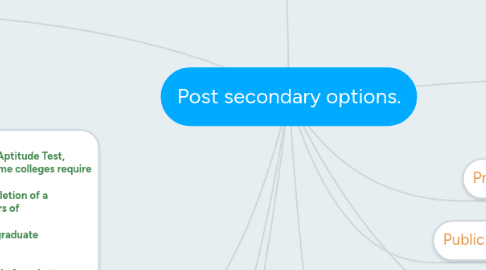Post secondary options.
by Jaye Schuelke

1. career technical distance education
2. 2 Year Colleges
2.1. A 2 year college can get you the degree you may need, but it doesn't have as broad of a curriculum as four year colleges.
2.2. You can get these degrees at a 2 year college: Associates degree Diplomas-not attend it for 2 years.
3. 4 Year Colleges
3.1. Attending a 4 year college gets you the degree you need to get into the career you want.
3.1.1. You can get these degrees at a 4 year college: Masters degree Bachelors degree Doctorate degree
3.1.1.1. FASFA-Free education for federal student aid Tuition-money charged for teaching Universities-advanced learning education institution
3.1.1.2. Careers TEACHERS
4. Vocabulary *SAT and ACT-Scholastic Aptitude Test, American College Test. Some colleges require these tests. *Associates Degree-Completion of a program in less than 4 years of college. *Bachelors Degree-Undergraduate degree offered by 4-year colleges. *Masters Degree-First level of graduate study; must have an undergraduate degree first. *Doctorate Degree-Academic or professional degree in that persons specific field.
5. Vocab Words: room and board-lodging and food paid by you. distance education-educating on an individual basis
6. Vocational: Privately owned schools with a wide variety of training options
7. Examples: Drake University Simpson College
8. Examples: University of Northern Iowa University of Iowa Iowa State
9. Private Colleges.
9.1. A college that is not operated by the government, but may receive grants and student loans. Private may cost more than attending a public school.
10. Public Colleges
10.1. A college funded by the public, through the government. Public doesn't usually cost as much as a private college.
11. Community College: A public two-year college Junior College: Similar to community college, but usually private


